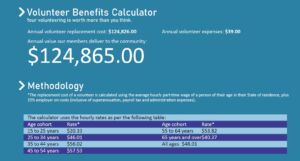National Volunteer Month
Volunteers Supporting Community Resiliency
Volunteers Supporting Community Resiliency
By Linda Crerar
Society needs resilient communities. Volunteering is a major engagement tool with open positions available in most communities. Joining people together helps to achieve stronger shared goals, strengthens trust and relationships as stronger bonds of solidarity are forged by creating strategies for managing risks. Localized volunteering helps communities organize, set priorities, and take ownership of local needs.
Community volunteer are frequently the first responders and may be the only source of available help available in a crisis. They help provide better interpretations of information to immediate crises with the abilities to be flexible, responsive in real time, and more readily adaptive to changing local conditions. Consider them as bridges and pathways for communication with external agencies and entities, like state and national governments.
Leadership development is another area where community volunteering drives resilience. Volunteering allows all people of any age, ethnicity, or ability to acquire leadership skills that will be a great value to the community in the future. Leadership skills help develops flexibility and the ability to deal and adapt to challenges and changing conditions. Volunteers create innovative solutions when providing their on-the-ground experience for crisis communications or find innovative ways to address restoration projects. Volunteering supports strong and resilient communities.
Disruptions have affected all aspects of society over the past few years. By March of 2020, 93% of all volunteering was cancelled, according to Volunteer Match Report. In response to these disruptions, some organizations had to limit services but others transformed their services and volunteer engagement programs. They reached out and showed how volunteers made impacts, were appreciated, and fit into the organization and community overall. Other groups transformed by diversifying with people of different abilities from different geographies, and with varied availability, increased accessibility, use of financial resources more efficiently, and increase capacity and impact.
What are some volunteer pathways to consider?
Youth pathway to schooling and employment. Gain knowledge and transferable skills for future employment. “Try before they buy” can align volunteering jobs to curriculum at colleges and university creating a focused educational roadmap.
Interested in working in environmental management? Volunteer with a conversation charity working to protect nature for future generations.
Looking at a career in sport and recreation? Local clubs rely on volunteers to make their games happen. Whether it’s with basketball, rugby, gymnastics or another activity, there are many ways to gain valuable exposure to the sector through volunteering
Is health an area you’re considering for your future career? Our state’s Search and Rescue organizations depend on volunteers to provide first aid treatment and offer training to hundreds of people each year.
Passionate about diversity, equity and inclusion? Organizations striving to promote equality and social justice often look to volunteers for support in delivering services and campaigns.
Considering a career in social services? Groups working to end homelessness and food insecurity need volunteers on a recurring and ad-hoc basis.
Maybe arts and culture are on the horizon? Volunteering at a museum or theatre can be a fantastic way to get a foot in the door.
And many more sectors!
Visit our Center’s website and for Volunteer and Career Pathways information at:
https://www.coehsem.com/workmarketplace/
Here are some helpful links to organizations where you can get started volunteering:
https://www.habitat.org/
https://www.citizenscience.gov/catalog/#
Find Fire Service Volunteer Opportunities (makemeafirefighter.org)
Volunteer Opportunities | Serve Washington
Serve Washington
Serve Washington a State Commission, advances national service, volunteerism and civic engagement to improve lives; expands opportunity to meet the local critical needs of residents of Washington; and strengthens community capacity while creating healthy and resilient communities. Authorized by Executive Order #16-08, a 20-member board of Governor- appointed commissioners supports and advises Serve Washington.
Serve Washington believes that national service, volunteerism, and civic engagement are the foundation for caring communities and a thriving Washington. Each year Washingtonians invest in our state through the contribution of their time as volunteers, as national service members and as members of volunteer groups. Serve Washington provides volunteer recognition for exceptional volunteers in the following ways. The Governor’s Volunteer Service Awards recognizes Washington’s volunteers for the service contributions they make to organizations and communities across our state in the past calendar year.
Learn more at servewashington.wa.gov
Our COE Advisory Board
Our Center wants to recognize our Advisory Board for their important service contributions over this past year. Our Board and our Senior Fellows promote collaboration between specific educational programs, business, industry, and labor. This prepares individuals to enter and succeed in their chosen career. Our Advisory Board is an effective means of helping the educational delivery system respond to the needs of a constantly changing labor market. An Advisory Board’s strength is reflected in the diversity of its membership. Our Center is proud of our Advisory Board whose members represent a diverse group from different genders, races, cultures, and backgrounds.
Please check out our website for information on our Board Members (https://www.coehsem.com/advisory-board/)
Our Center relies on each of its Advisory Board Members and Senior Fellows that contribute over 50 hours of volunteer time every year. Several members often contribute significantly more. The Center has 30 Advisory Board Members and 25 Senior Fellows who’s annual volunteers replacement costs $124,865, based on the national value. Every April, the Independent Sector publishes a national value for each volunteer hour. The numbers are both of national average and each state. The national value is now $23.56/hour and the Washington state value is $37.63/hour.
View the calculator at: https://www.volunteeringwa.org.au/resources/volunteer-benefits-calculator


